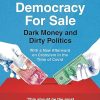Democracy for Sale: Dark Money and Dirty Politics
£8.70£9.50 (-8%)
The Sunday Times bestseller.
‘A compulsively readable, carefully researched account of how a malignant combination of rightwing ideology, secretive money (much of it from the US) and weaponisation of social media have shaped contemporary British (and to a limited extent, European) politics… Remarkable’ Observer, Book of the Week
Democracy is in crisis, and unaccountable and untraceable flows of money are helping to destroy it.
This is the story of how money, vested interests and digital skulduggery are eroding trust in democracy. Antiquated electoral laws are broken with impunity, secretive lobbying is bending our politics out of shape and Silicon Valley tech giants collude in selling out democracy. Politicians lie gleefully, making wild claims that can be shared instantly with millions on social media.
Peter Geoghegan is a diligent, brilliant guide through the shadowy world of dark money and digital disinformation stretching from Westminster to Washington, and far beyond.
Praise for Democracy for Sale:
‘Thorough, gripping and vitally important’ Oliver Bullough
‘A brilliant description of the dark underbelly of modern democracy. Everyone should read it’ Anne Applebaum
‘A compelling and very readable story of the ongoing corruption of our government and therefore ourselves’ Anthony Barnett
‘As urgent as it is illuminating’ Fintan O’Toole
‘This urgent, vital book is essential reading for anyone who wants to make sense of our politics’ Carole Cadwalladr
‘This forensic and highly readable book shows how so many of our democratic processes have moved into the murky, unregulated spaces of globalisation and digital innovation’ Peter Pomerantsev
‘A call to arms for all those who value democracy’ The Herald
‘Geoghegan’s words are those of someone who is prepared to keep fighting to defend and revitalise what shadows of democracy still remain’Scotsman
Read more
Additional information
| Publisher | Apollo (7 Jan. 2021) |
|---|---|
| Language | English |
| Paperback | 416 pages |
| ISBN-10 | 1789546044 |
| ISBN-13 | 978-1789546040 |
| Dimensions | 12.9 x 2.79 x 19.81 cm |










by P. L. EVANS
Democracy for Sale is an essential addition to a relatively small bundle of books that explain why governments have arrived at the strange place that they now occupy in 2020. It’s a strong contemporary account – required reading – but it’s also an important reference work.
Every political writer needs it in their bookshelf because it catalogues the players, the timelines and the techniques and the different kinds of small purposeful groups that have understood politics for the game that it is.
Geoghegan’s book is about a confluence of forces and phenomena. All of the obvious ones are there – Russia, Steve Bannon, Cambridge Analytica, etc. In particular, the book recognises the vast intellectual contribution that this network received from Five Star’s Gianroberto Cassalegio, and this alone justifies the cover price. It has also thrown an Irish curveball into the mix – the contribution of Ulster’s respectable churchy sectarians of the DUP to the wider alt-right ecology.
But it also shows how the vast economic powerhouse of social media has changed so much. It traces the way that it gave momentum to the older version of largely undiagnosed political corruption driven by the network of outwardly respectable political think-tanks such as the IEA (which is particularly neatly filleted in the book). This is not a journalistic clippings-job though. Geoghegan has done the legwork. He’s stayed on the story and followed the money. It takes the various small purposeful groups behind Brexit and other crude-populist movements and gives them the grudging respect that they deserve.
Written from a social democratic perspective, Geoghegan is plainly very worried by the right-wing politics that he is writing about. There’s a nice sense of the ridiculous in the book, and the crass narcissists of The Intellectual Dark Web make occasional appearances, but he also doesn’t hide a slight awe for the competence, the drive and the craft of political actors such as Nigel Farage, Aaron Banks, and Claire Fox, among a cast of hundreds.
It shows how the structures of liberal democracy have failed to adapt. Earnest technocrats have only been able to look on in bewilderment. ‘Hacking’ isn’t the real concern in a world where Facebook and Google are openly selling the kind of data that the most pernicious darknet operatives could only dream of finding. It’s written from a strong understanding of how these entrepreneurs have learned how to neutralise ‘the commons’ of constructive political discourse and drive a selectively de-funded political journalism in new directions.
Geoghegan can see how all of this can’t simply be explained by purposeful corruption. Liberal democratic politics left the doors unlocked and the lights on and it bears a lot of the blame for the burglaries that happened as a result.
So many other contemporary accounts are written like breathless commentaries on the soap opera of politics, without realising how dramatically political mechanisms have changed. By contrast, it shows how far conventional beltway political writing fails to grasp anything other than the surface patina of politics. One of the themes that runs though the book is the changing nature of public participation. This is not only an account of successful strategies – a more sophisticated and unpredictable public are also part of the story. With possible exceptions such as Eitan Hersh or David Swift, the political centre and left seem to have totally failed to grapple with the reality of modern democracy and the obsolescence of traditional activism in the face of the turbocharged upgrade of activism deployed by crude-populists.
The conclusions are a must-read. Geoghegan is absolutely writing about corruption here. It’s not just another wrinkle in the evolutionary story of modern democracy. This book shows social/liberal democracy- history’s most successful experiment and greatest success story – is currently locked onto a course that could end in its own destruction and that the electoral politics that drives it may be a fatally compromised mechanism. These forces won’t be deflected by journalists or by fact-checking. They’re too agile for the grinding gears of official oversight or checks-and-balances. Almost uniquely, the book has fully internalised an understanding that the ownership of the political process has been partly transferred into new hands and until that problem is acknowledged, we all have a lot to worry about.
It’s early reception in the newspapers is focusing on the various political scandals that it resurfaces, and in some cases, reveals for the first time. To its credit, the book is easy to read. It’s an attention grabber as it adds a number of new episodes to many of the long-running stories of recent years – the entrepreneurial jigsaw of corruption, crankery and political grifting that has renovated right-wing politics. It tells a strong convincing narrative for anyone who needs one and it understands the political nature of what has transpired. That crude-populism is a new kind of right-wing politics with a different character and different aims.
The only real way to fully understand is to see where it came from. This book is the best overview of that question that I’ve read so far.
by A Reader
In Democracy for Sale, Peter Geoghegan examines the opaque political groups, vested interests, and murky sources of funding that coalesced to deliver the Brexit referendum result of 2016, and their most recent UK iteration, the Johnson government.
At a time when news hurtles past relentlessly, Geoghegan places what UK voters have been experiencing as a cacophony of random events, viral outrages, and fringe ideologies into a cogent context, revealing malign networks of wealth and influence. He connects the players, the dark money, and thinktanks which have shaped political narratives over the last decade, revealing the damage already done to civil society and the ongoing threat. While the book occasionally reads like a thriller, Geoghegan’s tone is matter of fact and purposeful because the stakes for democratic societies could not be higher.
The political networks that want democracy dismantled thrive on constant chaos and spectacle, methodical analysis and competence are anathema to them, and are therefore the most potent weapons against them. An oligarch’s worst nightmare is an active and engaged citizenry, and that’s where we come in.
Political chaos is not inevitable, and our situation is grave, but far from hopeless. As Geoghegan points out “In 2019, under first-past-the-post electoral system, Britain’s Conservatives won 56.2 per cent of Commons seats with just 43.6 per cent of the vote. A shift of just 51,000 voters across 40 seats would have wiped out Boris Johnson’s “stonking” majority entirely.”
It’s easy in 2020 to become despondent and feel that progress is impossible. Peter Geoghegan’s book shows that small numbers of people with huge amounts of money can only thrive if they can make us feel powerless. It’s a crucial read, and first step towards, as the phrase goes, taking back control.
by Mr Bishop
A book so good it’s into its third print run only ten days after publication. Geoghegan’s inventory of dark money illuminates the circuits of cash and the seedy figures that influence what you see on television, in print and on your smartphone right now.
In tracing the ongoing influence of American and British corporations on politics and civic life, Democracy For Sale is a successor to Naomi Klein’s No Logo, updated for the age of the hypercharged online advertising blitz.
But by showing the mechanics of a reasonably small group of American and British think tanks and political cabals, Geoghegan’s book shows plainly that today’s gleeful corruption is the result of an ongoing project to force the inflammatory ideas of the ultraconservative right into a new kind of anti-democratic common sense – a very dirty ‘new normal’ that’s being hammered into citizens across the world today.
This is an important piece of work and storytelling for a number of reasons. It does the job that other journalists seem to have abandoned. It helps us to step back from our screens and the emotional hijacking of partisan headlines and outright lies as presented on social media. It helps us to think about digital literacy in a fundamental way. It shows how corrupt these well-fed yahoos really are, and how they’ll game the blind spots of established media and the law to shore up their own gross wealth, every day.
In this respect Democracy For Sale – like Christopher Wylie’s Mindf**k or Shoshana Zuboff’s The Age of Surveillance Capitalism – should have a generational effect in helping to clarify what’s happening under the bonnet of the internet. Like Nineteen Eighty-Four it’s a story of the new authoritarianism, but as a clear-eyed look at society today it’s like coming up for air.